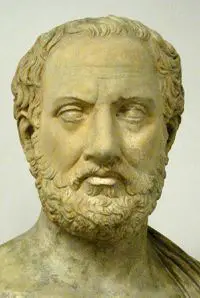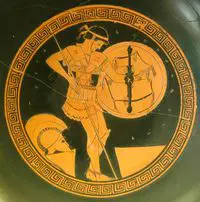Difference between revisions of "What has been the influence of the historian Thucydides"
| Line 1: | Line 1: | ||
[[File: Thucydides one.jpg|200px|thumb|left|Thucydides]] __NOTOC__ | [[File: Thucydides one.jpg|200px|thumb|left|Thucydides]] __NOTOC__ | ||
| − | + | The Greeks helped to develop democracy, philosophy, science, and drama, to name just a few of their achievements. They are also credited with establishing the discipline of history. They were the first to record events and facts in a systematic way and did not simply rely on myth to explain the past. | |
| + | |||
| + | The best-known Greek historian is Thucydides. He is still studied by academics, diplomats, military leaders and titans of business. Thucydides played a critical role in the development of histography. In his historical work, he formulated political theories that are still relevant to this day. His theories on power, war, and international relations are still influential and used to understand current geopolitics, in the 21st century. | ||
====The life and work of Thucydides==== | ====The life and work of Thucydides==== | ||
Revision as of 17:00, 31 January 2020
The Greeks helped to develop democracy, philosophy, science, and drama, to name just a few of their achievements. They are also credited with establishing the discipline of history. They were the first to record events and facts in a systematic way and did not simply rely on myth to explain the past.
The best-known Greek historian is Thucydides. He is still studied by academics, diplomats, military leaders and titans of business. Thucydides played a critical role in the development of histography. In his historical work, he formulated political theories that are still relevant to this day. His theories on power, war, and international relations are still influential and used to understand current geopolitics, in the 21st century.
The life and work of Thucydides
Thucydides was probably born about the year 400 B.C, the exact year is not known. The sources on the life of the great historian are fragmentary and often unreliable. His father was Olorus who said to have been a member of the Athenian elite and Thucydides was born in the city of Athens. It is possible, based on his father’s name that he was descended from Thracian royalty and, indeed he was later to own a gold mine and many lands in the region[1]. Thucydides was a skeptic and adopted a relativist approach to justice and morality, in his work and it appears that he was apparently greatly influenced by the philosophers known as the Sophists. His philosophical position is that human beings are motivated by power and needs’ and they are largely conditioned by society and their environment. In 431 BC, the Peloponnesian War broke out between Sparta and Athens, which was a brutal conflict for dominance in the Greek world (431-404 BC). Apparently, in 421 BC, Thucydides was elected a strategos or general by the Athenian popular Assembly. This would indicate that he was already an experienced military commander and was a well-known public figure. It is clear based on the reading of his later work that he was an admirer of the Athenian politician Pericles and was possibly associated with the popular party in the city. He was sent to Thrace possibly because of his connections with the region and he did have considerable influence with the Thracians. In the winter of 423 BC, the Spartans attacked the strategic city of Amphipolis, which was not far from where Thucydides and an Athenian force were based. The Athenian commander at Amphipolis sends a message for help. The Spartan commander, Brasidas was aware that Thucydides was nearby, and he offered the citizens of Amphipolis, generous terms. This clever strategy meant the Spartans were able to take the city before Thucydides arrived. When news arrived in Athens that Amphipolis was captured by the enemy there was an outcry. The Athenian Assembly voted to exile Thucydides for his perceived failure to save the city. All his life, he maintained that he simply arrived too late to save the city and it does seem that he was unfairly treated. It appears that the historian was to spend most of the rest of his life, unable to return to Athens. He was a very resourceful man and he used his status as an exile to travel throughout the Greek world and he was able to collect the eyewitness accounts of both sides in the Peloponnesian War. Moreover, he was an independently wealthy man, and this meant in his own words ‘I had leisure to observe affairs somewhat particularly’ [2]. After his exile from Athens, the sources on his life becoming even more fragmentary and unreliable. In one account it is claimed that he was permitted to return to the city of his birth and once again entered into public life. In another work, it is reported that Thucydides was murdered in Thrace. What we do know is that his great history of the Peloponnesian War ended in 411 BC. It is widely believed that this was possibly the year of his death. His work of recording the war between Athens and Sparta was continued by others. Thucydides only wrote one work and he devoted his life to it. His History of the Peloponnesian War is regarded as one of the greatest masterpieces of histography of all time and it has also been praised for its literary style. The work of Thucydides was admired by the Romans. However, after the Fall of Rome, the works of Thucydides were little read and it was only with the Renaissance that interest revived in the great history. His work was enormously influential, and it was even translated by the British philosopher Thomas Hobbes. Thucydides' history was widely regarded as the model work for all historians until the emergence of new ideas about histography, in the 19th century, popularized by among others Von Ranke.
The father of scientific history
Prior to Thucydides history was no better than a collection of stories and myths. Herodotus who is widely regarded as the Father of History by many still used many stories in his work and there are many fantastical tales in his writings. He did not critically analyze his sources and he appears’ to have simply reproduced what he was told. Thucydides was much more critical, and he appears to have sought out records and eyewitnesses that were contemporaneous with the events that he sought to record. While it is common for modern historians to use reliable sources, the Athenian was the first to use sources in a critical way. Thucydides was determined to be objective and to take a neutral stance in his work, this was despite the fact that he has been an Athenian general. In his work, Thucydides sought to be fair and to give an accurate description of what happened to the best of his ability. In his work, he is scrupulously fair to both sides of the conflict and did not seek to prejudge the events. He frequently shows the brutality and stupidity of the people of Athens and their elected leaders. However, achieving complete objectivity and impartiality is impossible and occasionally Thucydides’ bias can be seen, for example in his damning portrait of Cleon, an Athenian politician who is portrayed as an inept demagogue [3]. However, Thucydides' commitment to objectivity was crucial in the development of a more scientific approach to histography. Another feature of Thucydides was that he did not invoke the gods or the supernatural in his narrative. Indeed, many have speculated that the Athenian was one of the first known atheists. In his work, all causation is as a result of some human volition [4]. In the history of Thucydides, all explanations are down to human decisions or chance. For example, the bad decisions of the Athenians, such as the attack on Syracuse are a result of its moral decline, especially after the death of Pericles [5]. In his history of the great war between Sparta and Athens, he seems to suggest that there are laws that govern history such as the quest for self-interest and power. He adopted a systematic approach to the investigation of the historical phenomenon, and this was an innovation. This is something that is the norm in modern histography and much of this can be credited to Thucydides.
Great history or Great Literature
There are those who do not believe that the Greek was an objective historian. They point to the many speeches that are included in the work of the Athenian, the best known of which is Pericles’ ‘Funeral Oration’ [6]. Many historians point, to the fact that these speeches could not be accurate records of the actual words of the orators. This has led many to claim that the work of the Athenian is not history in the strict sense, but rather a genre of literature. Many have regarded Thucydides as a great writer who has revealed unparalleled insights into the nature of power and the human condition [7] The historians work have inspired many other literary-minded historians down the ages, especially in his use of speeches and literary techniques, including the Roman, Tacitus.
Thucydides and the realist school of international relations
Among the key themes of the History of the Peloponnesian War are Empire, war, and power. Thucydides had a bleak view of human nature and this influenced his view of international relations. For him, the strong will always prey on the weaker and seek to dominate them. This is illustrated in the destruction of Melos by Athens in the History of the Peloponnesian War. In his famous Melian dialogue, the former general sets out a view of international relations as one which is anarchic and which is not governed by any sense of justice [8]. Thucydides is widely seen as the father of the realist school of international affairs. This privileged military power, national interests and the state. It holds that religion and morality have no place in politics and that relations between states, is characterized as everyone trying to further one’s own interests at the expense of others, as was the case among the city-states during the Peloponnesian War. Thucydides was pessimistic about human nature and did not believe that societies could change. Any society that was not prepared for war and to further their own interests will not survive or prosper. This influenced among others Machiavelli, Hobbes and Rousseau. It later developed in the 19th century into the school of thought that promoted the idea that states should be powerful and seek to dominate others in their own interests. It has been enormously influential in politics and diplomacy and remains so to this day [9].
Thucydides trap
He was the first to really propose a theory of war, which he believed was a result of the interaction of human nature, national interests, and chance events. The former general’s thesis in the History of the Peloponnesian War is that the war between Sparta and Athens was inevitable. The disgraced general believed that when a rising power such as Athens comes into contact with an established power such as Sparta that conflict is inevitable. In the words of Thucydides ‘It was the rise of Athens and the fear that this instilled in Sparta that made war inevitable’ [10]. It is inevitable that the rising power will seek to displace the existing power and this is because humans want to dominate the weaker. This has become known as the Thucydides trap, which roughly is the proposition that when a new power emerges that it is inevitable that there is going to be a war. It should be noted that it was not Thucydides who named this concept, but it was rather named after him, by academics in the twentieth century. This concept based on Thucydides' thesis on the origins of the Peloponnesian War has been enormously influential among politicians and diplomats.
Conclusion
Thucydides has been enormously influential in histography. His objectivity, rationalism and systematic collection of data had led him to be called the Father of History. However, he was also a great writer and his work is regarded as a literary masterpiece, which many read as they would a novel, to understand the human condition. The Athenians were one of the first to study international relations and he was the founder of the ‘realist school’ which has been very important in diplomacy and politics to this day. He was also one of the founders of political science because of his analysis of the Peloponnesian War and his thesis on the causes of war and conflict, the ‘Thucydides trap’ is still relevant in the 21st century.
Further Reading
Garst, D. (1989). Thucydides and neorealism. International Studies Quarterly, 33(1), 3-27.
Tsakmakis, Antonis, and Antonios Rengakos, eds. Brill's Companion to Thucydides. Brill, 2006.
Poole, J. C. F., and A. James Holladay. "Thucydides and the Plague of Athens." The Classical Quarterly 29, no. 2 (1979): 282-300.
Strassler, Robert B, ed. The Landmark Thucydides: A Comprehensive Guide to the Peloponnesian War. (New York: Free Press 1996).
References
- ↑ Connor, W. Robert, Thucydides (Princeton: Princeton University Press 1984), p. 117
- ↑ Thucydides, 2, 5
- ↑ Woodhead, Arthur Geoffrey. "Thucydides' portrait of Cleon." Mnemosyne 13, no. Fasc. 4 (1960): 289-317
- ↑ Greenwood, Emily. Thucydides and the Shaping of History. Bloomsbury Publishing, 2015), p. 113
- ↑ Thucydides, 3, 17
- ↑ Thucydides, 2, 35-45
- ↑ Hornblower, Simon, Thucydides (London: Duckworth 1987), p. 112
- ↑ Thucydides, 5, 84-116
- ↑ Forde, Steven. "International realism and the science of politics: Thucydides, Machiavelli, and neorealism." International Studies Quarterly 39, no. 2 (1995): 141-160
- ↑ Thucydides, I, 22


